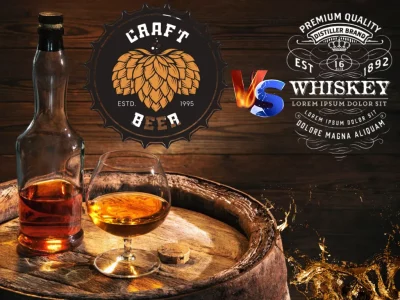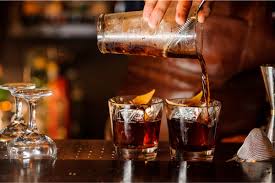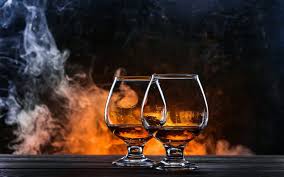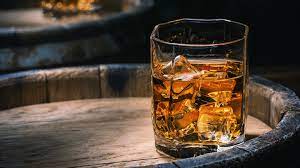Bourbon, scotch, whiskey, and brandy are all popular alcoholic beverages that are enjoyed by people around the world. Each of these drinks has its own unique taste and history, making them the favorites of many drinkers.
Understanding the differences between bourbon vs scotch vs whiskey vs brandy is important for those who want to explore the world of fine spirits and appreciate their distinct flavors. From the smoky and peaty notes of scotch to the sweetness of bourbon, there is something for everyone when it comes to these classic drinks.
Whether you’re a seasoned whiskey enthusiast or a newcomer to the world of spirits, exploring the nuances of bourbon vs scotch vs whiskey vs brandy can be a fascinating and rewarding experience.
Bourbon vs Scotch: What’s the Difference?
Bourbon and Scotch are both types of whiskey, but they have some significant differences in terms of their production, taste, and cultural significance.
- Production:
Bourbon is made primarily in the United States, with at least 51% corn in its mash bill (the mixture of grains used to make the whiskey). It must be aged in new, charred oak barrels, and it cannot be distilled to more than 80% alcohol by volume (ABV).
Scotch, on the other hand, is made exclusively in Scotland, with malted barley as the primary grain. It must be aged in used oak barrels (typically from bourbon or sherry), and it can be distilled to a much higher ABV than bourbon.
- Taste:
Bourbon is known for its sweet, rich, and full-bodied flavor, with notes of caramel, vanilla, and oak. It is often described as having a “smoother” taste than Scotch.
Scotch, on the other hand, has a more complex flavor profile, with a range of flavors that can vary widely depending on the specific type of Scotch (e.g., single malt, blended, peated, etc.). Some common flavors in Scotch include peat smoke, honey, fruit, and spice.
- Cultural significance:
Bourbon is a distinctly American spirit, and it has played an important role in the country’s history and culture. It is often associated with the South and with classic American cocktails like the Manhattan and the Old Fashioned.
Scotch, on the other hand, is an integral part of Scottish culture and identity, with a long history that dates back centuries. It is often associated with luxury and sophistication, and it is a popular drink in many countries around the world.
Bourbon vs Whiskey: Understanding the Key Differences
Bourbon and whiskey are both types of distilled spirits, but they differ in their production process, ingredients, and taste.
- Production:
Whiskey is a broad term that encompasses a variety of spirits made from fermented grains, such as barley, corn, rye, and wheat. The production process involves fermenting a mixture of grains, distilling the resulting liquid, and aging the spirit in oak barrels. Whiskey can be produced in different countries, including the United States, Ireland, Scotland, and Canada.
Bourbon, on the other hand, is a type of American whiskey made from at least 51% corn in the mash bill. It must be aged in new, charred oak barrels, and it cannot be distilled to more than 80% alcohol by volume (ABV). Bourbon is typically produced in Kentucky, but it can be made in other states as well.
- Ingredients:
As mentioned above, bourbon must contain at least 51% corn in its mash bill. Whiskey, on the other hand, can be made with a variety of grains, and the type of grain used can affect the taste of the final product. For example, rye whiskey is known for its spicy, peppery flavor, while wheat whiskey is often described as soft and mellow.
- Taste:
Bourbon is known for its sweet, rich flavor, with notes of caramel, vanilla, and oak. It has a smooth and slightly sweet taste, and it is often used in classic American cocktails like the Manhattan and the Old Fashioned.
Whiskey, on the other hand, has a wide range of flavors, depending on the type of whiskey and the specific brand. Some whiskeys are smooth and mellow, while others are bold and spicy. Scotch whiskey, for example, is known for its smoky, peaty flavor, while Irish whiskey is often described as smooth and creamy.
Furthermore, while bourbon is a type of whiskey, they differ in terms of its production process, ingredients, and taste. Bourbon is a distinctly American spirit made with at least 51% corn, while whiskey is a broad term that encompasses a range of spirits made from fermented grains.
Single Malt Scotch vs Blended Scotch: Which One is Better?
It’s difficult to say whether single malt Scotch or blended Scotch is better because it largely depends on personal taste and preferences.
Single malt Scotch is made from 100% malted barley and is produced by a single distillery in Scotland. It is aged for a minimum of three years in oak barrels and is known for its complex and nuanced flavors, which can vary depending on the specific distillery and region of Scotland. Single malts are often considered the gold standard of Scotch whiskey because of their high quality and artisanal production methods.
Blended Scotch, on the other hand, is a combination of different single malt whiskies and grain whiskies that are blended together to create a consistent flavor profile. Blends are typically less expensive than single malts and are often used in cocktails. Some blended Scotch brands have gained a reputation for high quality and complex flavors, such as Johnnie Walker and Chivas Regal.
Ultimately, the decision between single malt Scotch and blended Scotch comes down to personal preference. Single malts are known for their unique and complex flavors, while blends offer consistency and affordability. Both have their own merits and are enjoyed by whiskey lovers around the world.
The Top 10 Best Scotch Brands for Whiskey Lovers
The world of Scotch whiskey is vast and varied, with a wide range of brands and styles to choose from. Here are ten of the best Scotch brands that are beloved by whiskey lovers around the world:
- Macallan: Known for its rich, complex flavors and distinctive amber color, Macallan is one of the most sought-after Scotch brands in the world.
- Glenlivet: With a history dating back to 1824, Glenlivet is a classic Speyside Scotch known for its smooth and fruity taste.
- Lagavulin: This Islay Scotch is famous for its smoky, peaty flavor, which is derived from the local peat used to smoke the malted barley.
- Talisker: Produced on the Isle of Skye, Talisker is a full-bodied Scotch with a spicy, smoky flavor that is loved by many.
- Highland Park: This Orkney Scotch is known for its rich and complex flavors, with notes of heather, honey, and smoke.
- Laphroaig: Another Islay Scotch, Laphroaig is beloved by peat lovers for its intense smokiness and briny, seaweed-like flavor.
- Balvenie: This Speyside Scotch is known for its smooth and honeyed flavor, with hints of vanilla and oak.
- Oban: Produced in a small coastal town on the west coast of Scotland, Oban is a full-bodied Scotch with a rich, malty flavor.
- Glenfiddich: This Speyside Scotch is one of the best-selling single malt whiskies in the world, with a fruity and floral flavor profile.
- Ardbeg: Another Islay Scotch, Ardbeg is known for its intense smokiness and complex flavors, with notes of bacon, leather, and espresso.
Of course, there are many other excellent Scotch brands out there, and the best one for you will depend on your personal taste preferences.
What Makes a Good Brandy: A Guide for Novices
Brandy is a distilled spirit made from fermented fruit juice, typically grapes, but also other fruits such as apples or pears. Here are some key factors that contribute to a good brandy:
- High-quality fruit: The quality of the fruit used to make the brandy is essential to the flavor and aroma of the final product. The fruit should be ripe, healthy, and free from any defects or disease.
- Proper fermentation: The fermentation process is critical to the quality of the brandy. The fruit must be fermented properly, with the right balance of sugar, yeast, and other ingredients, to create the desired flavors and aromas.
- Distillation: The distillation process is where the alcohol is extracted from the fermented fruit juice. The quality of the distillation process can greatly affect the taste and aroma of the brandy.
- Aging: Brandy is typically aged in oak barrels, which can add complexity and depth to the flavor and aroma of the spirit. The length of aging can vary, but the best brandies are often aged for several years.
- Balance: Good brandy should have a balance of flavors and aromas, with no single element overpowering the others. The fruit, alcohol, and oak flavors should be in harmony, creating a smooth and complex profile.
- Smoothness: Good brandy should be smooth and easy to drink, with a pleasant warmth and no harshness or bitterness.
- Complexity: The best brandies have a depth of flavor and aroma that evolves over time, with new notes and subtleties emerging as the brandy is savored.
Ultimately, the best brandy for you will depend on your personal taste preferences, but a good brandy should have the qualities listed above, with a balance of flavors and aromas, a smooth and easy-drinking character, and a complexity that rewards careful tasting.
Bourbon vs Rye Whiskey: Which One Should You Choose?
Bourbon and rye whiskey are both popular American whiskey styles, but they have some key differences that may influence which one you choose.
Bourbon is made from a mash bill that consists of at least 51% corn and is aged in charred oak barrels. It is known for its sweet and smooth flavor profile, with notes of vanilla, caramel, and oak. Bourbon is a great choice for sipping neat or on the rocks, and it also makes a great base for cocktails.
Rye whiskey, on the other hand, is made from a mash bill that consists of at least 51% rye and is also aged in charred oak barrels. It is known for its spicy and bold flavor profile, with notes of pepper, cinnamon, and other spices.
Also, Rye whiskey is a great choice for those who prefer a more complex and assertive flavor profile, and it is also a popular ingredient in classic cocktails like the Manhattan and the Old Fashioned.
So, which one should you choose? It really depends on your personal taste preferences. If you enjoy sweet and smooth flavors with a touch of oak, then bourbon might be the better choice for you. But if you prefer a spicier and bolder flavor profile with a lot of complexity, then rye whiskey might be the way to go.
Ultimately, both bourbon and rye whiskey have their own unique qualities and are beloved by whiskey lovers around the world. The best way to find out which one you prefer is to try them both and see which one speaks to your palate.
Health Benefits and Risks of Drinking Bourbon, Scotch, Whiskey, and Brandy
Alcoholic beverages, including bourbon, Scotch, whiskey, and brandy, can have both health benefits and risks. Here are some things to keep in mind:
Health benefits:
- Moderate alcohol consumption has been linked to a reduced risk of heart disease, stroke, and type 2 diabetes. This is due in part to the antioxidants and anti-inflammatory compounds found in alcoholic beverages.
- Drinking moderate amounts of whiskey or brandy may help to relax the muscles and reduce stress and anxiety.
- Whiskey and brandy have been used for medicinal purposes for centuries and are sometimes still used today to treat ailments such as coughs and colds.
Risks:
- Excessive alcohol consumption can lead to a range of health problems, including liver disease, high blood pressure, and an increased risk of certain types of cancer.
- Drinking too much bourbon, Scotch, whiskey, or brandy can lead to alcohol addiction, which can have serious social, personal, and health consequences.
- Drinking alcohol can impair judgment and motor skills, which can increase the risk of accidents and injuries.
- Some people may have an allergic reaction to the ingredients in certain alcoholic beverages, which can cause symptoms such as hives, itching, and difficulty breathing.
- Drinking alcohol during pregnancy can increase the risk of birth defects and developmental problems in the baby.
It’s important to remember that while moderate alcohol consumption may have some health benefits, it’s not a necessary part of a healthy lifestyle.
If you choose to drink alcoholic beverages, it’s important to do so in moderation and to be aware of the potential risks. If you have any concerns about your alcohol consumption or its impact on your health, speak with your healthcare provider.
The Aging Process: How Long Should Bourbon, Scotch, Whiskey, and Brandy Be Aged?
The aging process is a crucial part of producing high-quality bourbon, Scotch, whiskey, and brandy. The amount of time that a spirit is aged can have a significant impact on its flavor profile and overall quality.
Here’s a brief overview of how long each of these spirits should be aged:
- Bourbon: According to U.S. law, bourbon must be aged in new, charred oak barrels for a minimum of two years to be considered straight bourbon. However, many distillers choose to age their bourbon for longer periods of time, with some high-end bourbons being aged for up to 20 years or more.
- Scotch: Scotch whisky must be aged in oak barrels for a minimum of three years. However, most Scotch whiskies are aged for longer periods of time, with many high-end whiskies being aged for 12 years or more.
- Whiskey: The aging requirements for whiskey vary depending on the type of whiskey. For example, Irish whiskey must be aged for a minimum of three years, while Canadian whiskey has no minimum aging requirement. Some high-end whiskies, such as Japanese whiskies and American single malt whiskies, may be aged for 10 years or more.
- Brandy: Brandy is typically aged in oak barrels for a minimum of three years. However, many high-end brandies are aged for much longer, with some being aged for up to 20 years or more.
It’s worth noting that the aging process is not an exact science, and the length of time that a spirit is aged can vary depending on a range of factors, including the type of barrel used, the climate and humidity of the aging environment, and the specific goals of the distiller.
The best way to determine how long a particular spirit should be aged is to rely on the expertise of experienced distillers and tasters.
The Best Ways to Enjoy Bourbon, Scotch, Whiskey, and Brandy
Bourbon, Scotch, whiskey, and brandy are all complex and flavorful spirits that can be enjoyed in a variety of ways.
Here are some of the best ways to enjoy these spirits:
- Neat: One of the simplest ways to enjoy a good bourbon, Scotch, whiskey, or brandy is to drink it neat or without any additional mixers or ingredients. This allows you to appreciate the spirit’s unique flavor profile and complexity.
- On the rocks: Adding a few ice cubes to your bourbon, Scotch, whiskey, or brandy can help to mellow out the flavor and aroma, making it easier to drink for some people. However, be careful not to dilute the spirit too much with ice.
- With a splash of water: Adding a splash of water to your bourbon, Scotch, whiskey, or brandy can help to release some of the more subtle flavors and aromas. Some experts even recommend adding a few drops of water to high-proof whiskies to help them open up.
- In a cocktail: Bourbon, Scotch, whiskey, and brandy can all be used in a wide range of classic cocktails, such as the Manhattan, Old Fashioned, and Sidecar. These cocktails typically include additional ingredients like bitters, vermouth, or citrus juices.
- With food: Bourbon, Scotch, whiskey, and brandy can all be excellent accompaniments to certain types of food. For example, a smoky Scotch whisky can pair well with rich meats like steak or lamb, while a sweeter bourbon can complement desserts like pecan pie or bread pudding.
Ultimately, the best way to enjoy bourbon, Scotch, whiskey, or brandy is whichever way you like it best. Experiment with different serving methods and pairings to discover your own personal favorites.
Conclusion
Here you get to know more about bourbon vs scotch vs whiskey vs brandy. Bourbon, Scotch, Whiskey, and Brandy are all popular types of distilled spirits with distinct characteristics. Bourbon is a type of American whiskey made primarily from corn and aged in charred oak barrels. It is known for its sweet and smooth flavor profile.
Scotch is a type of whiskey made in Scotland from malted barley and aged in oak barrels. It is known for its smoky, peaty flavor profile.
Whiskey is a broad category of distilled spirits that includes Bourbon, Scotch, and other types of whiskey made from various grains. It can be aged in a variety of barrels and can have a wide range of flavor profiles.
Brandy is a type of distilled spirit made from fermented fruit juice or wine and aged in oak barrels. It is known for its rich and complex flavor profile.
Ultimately, the choice between Bourbon, Scotch, Whiskey, and Brandy comes down to personal preference and the occasion. Each has its own unique flavor profile and characteristics that make it suitable for different occasions and tastes.




